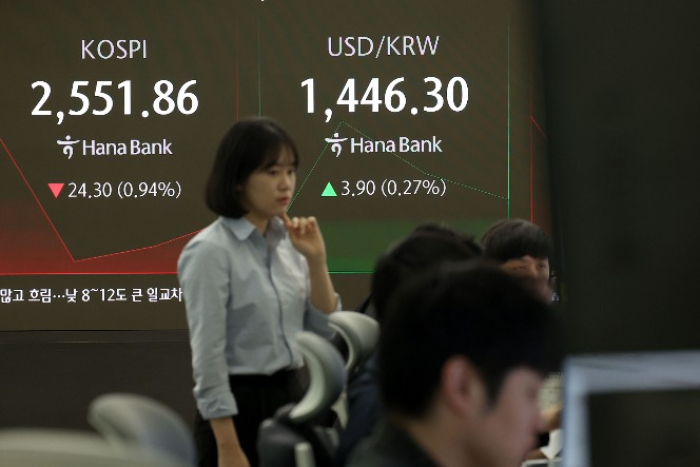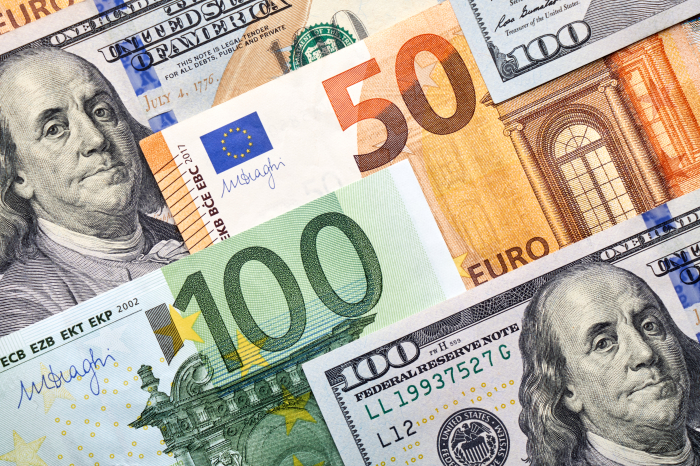Seoul to lift curbs on banks' investment in kimchi bonds
The government will also raise the cap on banks' derivatives trading for clients' forex exposure hedging
By Mar 09, 2025 (Gmt+09:00)
LG Chem to sell water filter business to Glenwood PE for $692 million


KT&G eyes overseas M&A after rejecting activist fund's offer


Mirae Asset to be named Korea Post’s core real estate fund operator


StockX in merger talks with Naver’s online reseller Kream


Meritz backs half of ex-manager’s $210 mn hedge fund



South Korea will lift restrictions on banks' purchase of domestically issued foreign currency bonds, dubbed “kimchi bonds," as part of policy efforts to boost US dollar inflows as individual investors' rush into overseas stocks fuels demand for the greenback.
The Ministry of Economy and Finance on Sunday also announced an increase in the cap on financial institutions' foreign exchange derivatives trading for domestic clients' currency hedging, raising it from the current 100% of their exposure to 125%.
The moves are the latest in a series of deregulations that the government has unveiled since late last year to prop up the Korean currency as the country's foreign exchange reserves shrank to their lowest level in nearly five years in February.
Those new measures will take effect within the first half of this year, the ministry said in a statement jointly released by the Financial Services Commission (FSC), the Financial Supervisory Service (FSS) and the Bank of Korea.
They also eased restrictions on domestic banks' foreign currency lending to Korean companies. Starting on Monday, they will be allowed to lend dollars through overseas offices for conversion into Korean won, thus enabling domestic companies to use them for capital expenditures.

KIMCHI BONDS
Seoul has prohibited financial institutions from buying kimchi bonds since late 2011, as a majority of their issuers converted them to Korean won for domestic use. This pattern was blamed for increasing corporate debts beyond limits and strengthening the won.
The government now expects kimchi bonds to boost dollar supply, counterbalancing the greenback demand from individual stock investors.
Yet analysts remain skeptical about its impact. They pointed out that higher funding costs in the dollar, compared with those in the Korean won, will lessen the appeal of kimchi bonds.
A finance ministry official said that kimchi bond sellers can sharply reduce dollar funding costs through currency rate swaps. Alternatively, they can sell bonds in Japanese yen at home to secure won at lower costs.

FOREX HEDGING LIMITS
Under the new rules, financial institutions will be permitted to hedge up to 125% of their corporate clients' foreign currency exposure.
Since 2010, their derivatives transactions for corporate clients’ currency hedging have been capped at 100%. That means that their currency hedges for clients through derivatives trading could not exceed the latters' forex exposure, or exports.
In December, the government eased the restrictions on banks’ exposure to forward positions and expanded the ceiling of foreign currency loans to be used for conversion to Korean won.
It also increased the foreign exchange swap line between the National Pension Service (NPS) and the Bank of Korea to reduce the pension operator's dollar buying on the domestic spot market.
The policy measures have not reversed the won's weakness, however.
“Foreign currency outflows have continued to exceed inflows since the start of this year amid external uncertainties such as US tariff policies,” the ministry said in the joint statement.
Foreign investors transferred $1.61 billion abroad from the proceeds of domestic stock investments in January, according to the FSS.
In comparison, individual investors poured $10.81 billion into overseas stock markets in the January-February period, according to the Korea Securities Depository.
Write to Ik-Hwan Kim at lovepen@hankyung.com
Yeonhee Kim edited this article.
-
 EconomyS.Korea logs current account surplus in Jan; Growth slows
EconomyS.Korea logs current account surplus in Jan; Growth slowsMar 07, 2025 (Gmt+09:00)
3 Min read -
 Foreign exchangeSouth Korea’s forex reserves dip to nearly 5-year low in February
Foreign exchangeSouth Korea’s forex reserves dip to nearly 5-year low in FebruaryMar 06, 2025 (Gmt+09:00)
2 Min read -
 RegulationsSouth Korea to fully resume short selling in March: FSC Chief
RegulationsSouth Korea to fully resume short selling in March: FSC ChiefFeb 24, 2025 (Gmt+09:00)
4 Min read -
 Sovereign bondsForeigners return to Korean debt market; Korea on course to join WGBI
Sovereign bondsForeigners return to Korean debt market; Korea on course to join WGBIFeb 13, 2025 (Gmt+09:00)
3 Min read -
 Foreign exchangeNPS initiates strategic currency hedging to unleash up to $48.2 billion
Foreign exchangeNPS initiates strategic currency hedging to unleash up to $48.2 billionJan 03, 2025 (Gmt+09:00)
3 Min read -
 Foreign exchangeSouth Korea expands foreign banks' access to forex market
Foreign exchangeSouth Korea expands foreign banks' access to forex marketJan 03, 2025 (Gmt+09:00)
2 Min read -
 Foreign exchangeKorea to relax FX rules by December to boost dollar selling
Foreign exchangeKorea to relax FX rules by December to boost dollar sellingDec 23, 2024 (Gmt+09:00)
3 Min read -
 Foreign exchangeSouth Korea to ease foreign exchange regulations, expand FX swap line
Foreign exchangeSouth Korea to ease foreign exchange regulations, expand FX swap lineDec 20, 2024 (Gmt+09:00)
4 Min read -
 Pension fundsNPS expects Korea’s WGBI inclusion to attract $56 billion in foreign funds
Pension fundsNPS expects Korea’s WGBI inclusion to attract $56 billion in foreign fundsNov 24, 2024 (Gmt+09:00)
2 Min read -
 Sovereign bondsKorea on watch list for WGBI inclusion; hoping for bond inflows
Sovereign bondsKorea on watch list for WGBI inclusion; hoping for bond inflowsSep 30, 2022 (Gmt+09:00)
3 Min read


